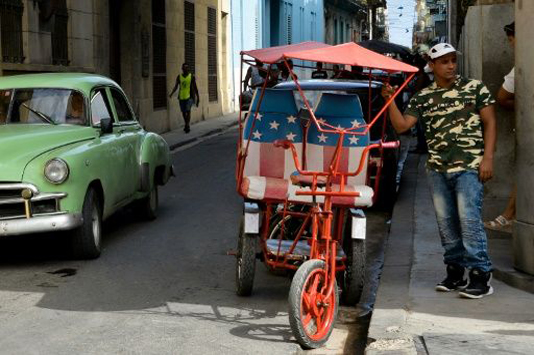HAVANA, April 19, 2019 (BSS/AFP) – The United States may have announced a
raft of measures that could hamper investment in Cuba in a bid to ramp up
pressure on the communist government, but in Havana life is trundling along
with the usual serenity.
The peace is only broken by the mention of US President Donald Trump’s name.
“It’s a constant threat, I think Trump is a complicated person who likes to
hold the people in an iron grip. That’s his way,” said Mercedes Martinez, an
85-year-old teacher.
Washington on Wednesday announced new restrictions on US travel and
remittances to the Caribbean island nation, and gave the green light to
lawsuits in US courts against companies operating in properties seized since
the late Fidel Castro’s communist revolution in 1959.
That brought a stern rebuke from Havana and criticism from the EU — Cuba’s
largest foreign investor.
“These were legally nationalized,” said Cuba’s Foreign Minister Bruno
Rodriguez in reference to the seized properties.
Trump’s National Security Advisor John Bolton said on Wednesday that the US
would bar Americans from travelling to Cuba except to visit family, reversing
the loosening of restrictions under Barack Obama that had started to open the
cash-strapped island to US tourism.
Remittances sent to Cuba will be limited to just $1,000 per quarter per
individual.
“These new measures will help steer American dollars away from the Cuban
regime,” said Bolton.
Many Cubans rely on such international transfers to supplement their
earnings. – Threat to tourism –
Cuba is in desperate need of capital to boost a stuttering economy.
It attracted only $2 billion in investments in 2017, well short of the $5
billion needed to spark growth.
Cubans’ primary concern is a shortage of food, exacerbated in no small
part by US sanctions first applied in 1962.
The latest US measures won’t help and could hit the tourism industry hard.
The Habana Libre hotel in the central Vedado neighborhood of the capital is
a case in point. Formerly the Havana Hilton, it was nationalized during the
revolution and could be subject to a claim in US courts.
However, locals say Trump’s measures won’t bring the country to its knees.
“That’s not going to happen, here everyone helps each other. We’re not
going to let anything go,” said housewife Iris Lara.
Trump says the measures against Cuba are justified by the island nation’s
support for socialist ally Nicolas Maduro, the Venezuelan president whose re-
election last year has been rejected by the US and more than 50 countries.
On Havana’s iconic Malecon promenade there are few signs of the impending
problems. Unconcerned tourists meander in search of a 1950s convertible or
pristine beaches.
Cuba expects to welcome five million tourists this year.
It has thrown all its eggs into the tourism basket in a bid to boost the
economy, investing in luxury hotels in partnership with European companies
such as France’s Accor or Span’s Melia — which runs the Habana Libre.
Several European Union companies could find themselves impacted by the US
measures, which come into effect on May 2.
The EU originally helped block the US measures from entering into force
more than 20 years ago when the Helms-Burton Act was first passed by the US
Congress in 1996.
The provision had been systematically suspended by US presidents every six
months since then.
– Cuba not ‘losing sleep’ –
The EU has warned the US it would be “obliged to use all means at its
disposal … to protect its interests” and could get the World Trade
Organization involved.
Alberto Navarro, the EU’s ambassador in Havana, says the measures are a
deliberate attempt to scare away potential investors in Cuba.
“It’s so that a company says: fine, instead of investing in Cuba, I’m going
to invest in Punta Cana (in the Dominican Republic,” he said.
Rodriguez accused the US of “an attack against International Law and the
sovereignty of #Cuba & third States” in a tweet on Wednesday.
Although he insisted Cuba would manage “without losing sleep, with total
calmness, enthusiasm and the knowledge that we’re on the right path — we’ll
tackle whatever difficulty.”
Fighting off US intervention in its internal affairs is nothing new for
Cuba, which repelled the CIA-led Bay of Pigs invasion in 1961.
Martinez’s grandfather took part in the movement to gain independence from
the Spanish Crown in 1895 and her father in Castro’s 1959 revolution.
She herself took part in activities during the 1962 Cuban missile crisis
while her generation rode the economic bumps of the 1990s sparked by the
collapse of the Soviet Union.
“We’re not afraid, we’re united, but we’re not willing to fight like little
children,” she said.
“What does he (Trump) hope to gain from all this?”



